2009 年 6 月 ACCA 考试 F4 真题及答案
ALL TEN questions are compulsory and MUST be attempted
1 Explain the meaning and operation of the doctrine of precedent in relation
to:
(a) the English legal system; (6 marks)
(b) ONE of the following:
(i) a civil law system;
OR
(ii) a Sharia law system. (4 marks)
(10 marks)
2 (a) Assess the relative advantages and disadvantages of arbitration as an
alternative to court proceedings in
respect of international business transactions. (5 marks)
(b) In relation to the UNCITRAL Model Law on International Commercial
Arbitration, explain the meaning and
significance of statements of claim and statements of defence. (5 marks)
(10 marks)
3 In the context of the UN Convention on Contracts for the International Sale
of Goods, explain the obligations
relating to price placed on the buyer.
(10 marks)
4 In relation to company law, explain:
(a) the limitations on the use of company names; (4 marks)
(b) the tort of 'passing off'; (4 marks)
(c) the role of the company names adjudicators under the Companies Act 2006.
(2 marks)
(10 marks)
5 In relation to company law, explain:
(a) the doctrine of capital maintenance; (4 marks)
�
(b)the circumstances under which both a public and a private company can reduce
its capital and the procedure to be followed. (6 marks)
(10 marks)
6 State and explain the grounds upon which a person may be disqualified under
the Company Directors
Disqualification Act 1986.
(10 marks)
7 In the context of the UN Convention on International Bills of Exchange and
International Promissory Notes:
(a) define an international bill of exchange; (4 marks)
(b) explain the meaning and effect of endorsement. (6 marks)
(10 marks)
8 In January 2008 Arti, a Belgian wholesaler of industrial chemicals, entered
into a contract to supply Bo, a Danish manufacturer, with 1,000 tonnes of sulphuric
acid to be delivered by 31 June 2008. Arti despatched the acid by ship on 20 June
to ensure it would be delivered to Bo on time and sent the bill of lading to Bo.
However, on 29 June and before the acid had been delivered, Arti received a telex
from Bo stating that he no longer needed the acid and would not be going through
with the contract.
Required:
Advise Arti as to what action he can take under the UN Convention on Contracts
for the International Sale of Goods, paying particular attention to the effect of
Article 71 of the Convention relating to anticipatory breach of contract.
(10 marks)
9 Clean Ltd was established some five years ago to manufacture industrial
solvents and cleaning solutions, and Des was appointed managing director.
The company's main contract was with Dank plc a large industrial conglomerate.
In the course of its research activity, Clean Ltd's scientists developed a new
super glue. Des was very keen to pursue the manufacture of the glue but the board
�
of directors overruled him and decided that the company should stick to its core
business.
The managing director of Dank plc is a friend of Des's and has told him that
Dank plc will not be renewing its contract with Clean Ltd as he is not happy with
its performance. He also told Des that he would be happy to continue to deal with
him, if only he was not linked to Clean Ltd.
Following that discussion Des resigned from his position as managing director
of Clean Ltd and set up his own company, Flush Ltd which later entered into a contract
with Dank plc to replace Clean Ltd. Flush Ltd also manufactures the new glue
discovered by Clean Ltd's scientists, which has proved to be very profitable.
Required:
In the context of company law, advise the board of Clean Ltd as to whether they
can take any action against Des or Flush Ltd.
(10 marks)
10 Greg is a member of the board of directors of Huge plc. He also controls a
private limited company Imp Ltd through which he operates a management consultancy
business. He also owns all the shares in Jet Ltd through which he conducts an
investment business.
When Greg learns that Huge plc is going to make a take-over bid for Kop plc he
arranges for Jet Ltd to buy a large number of shares in Kop plc on the London stock
exchange on which it makes a large profit when it sells them after the take-over
bid is announced. He then arranges for Jet Ltd to transfer the profit to Imp Ltd
as the charge for supposed consultancy work. The money is then transferred to Greg
through the declaration of dividends by Imp Ltd.
Required:
Analyse the above conduct from the perspective of criminal law paying particular
attention to the issues of:
(a) insider dealing; and (5 marks)
(b) money laundering. (5 marks)
(10 marks)
�
Fundamentals Level -Skills Module, Paper F4 (GLO)
Corporate and Business Law (Global) June 2009 Answers
In relation to aspect of business law the default law and cases refer to the
United Kingdom,however relevant law from other jurisdictions will be credited where
appropriate.
1 This question requires candidates to explain the way in which the doctrine
of precedent operates within two of three legal systems, although it is recognised
that the doctrine is essentially an aspect of Common Law systems.
(a) Precedent in the English Common Law
The doctrine of binding precedent, or stare decisis, lies at the heart of the
English legal system. The doctrine refers to the fact that within the hierarchical
structure of the English courts, a decision of a higher court will be binding on
a court lower than it in that hierarchy. When judges try cases they will check to
see if a similar situation has come before a court previously. If the precedent was
set by a court of equal or higher status to the court deciding the new case then
the judge in the present case should normally follow the rule of law established
in the earlier case.
It is important to establish that it is not the actual decision in a case that
sets the precedent; that is set by the rule of law on which the decision is founded.
This rule, which is an abstraction from the facts of the case, is known as the
ratio decidendi of the case.
Any statement of law that is not an essential part of the ratio decidendi is,
strictly speaking, superfluous; and any such statement is referred to as obiter
dictum, i.e. said by the way. Although obiter dicta statements do not form part
of the binding precedent they are persuasive authority and can be taken into
consideration in later cases.
There are numerous perceived advantages of the doctrine of stare decisis;
amongst which are:
(i)Time saving. This refers to the fact that it saves the time of the judiciary,
lawyers and their clients for the reason that cases do not have to be re-argued.
�
In respect of potential litigants it saves them money in court expenses because they
can apply to their solicitor/barrister for guidance as to how their particular case
is likely to be decided in the light of previous cases on the same or similar points.
(ii) Certainty. Once the legal rule has been established in one case,
individuals can act with regard to that rule relatively secure in the knowledge that
it will not be changed by some later court.
(iii) Flexibility. This refers to the fact that the various mechanisms by means
of which the judges can manipulate the common law provides them with an opportunity
to develop law in particular areas without waiting for Parliament to enact
legislation.
The main mechanisms through which judges alter or avoid precedents are:
(i) Overruling, which is the procedure whereby a court higher up in the
hierarchy sets aside a legal ruling established in a previous case.
(ii) Distinguishing, on the other hand, occurs when a later court regards
the facts of the case before it as significantly different from the facts of a cited
precedent. Consequently it will not be bound to follow that precedent. Judges use
the device of distinguishing where, for some reason, they are unwilling to follow
a particular precedent.
Disadvantages of Case Law
(i) Uncertainty. This refers to the fact that the degree of certainty provided
by the doctrine of stare decisis is undermined by the absolute number of cases that
have been reported and can be cited as authorities. This uncertainty is increased
by the ability of the judiciary to select which authority to follow through use of
the mechanism of distinguishing cases on their facts.
(ii) Fixity. This refers to possibility that the law in relation to any
particular area may become set on the basis of an unjust precedent with the
consequence that previous injustices are perpetuated. An example of this is the long
delay in the recognition of the possibility of rape within marriage, which has only
been recognised relatively recently.
�
(iii) Unconstitutionality. This is a fundamental question that refers to the
fact that the judiciary are in fact overstepping their theoretical constitutional
role by actually making law rather than restricting themselves to the role of simply
applying it.
(b) Precedent in Civil Law
If Common Law judges look to previous cases in order to find law, judges in
Civil Law systems look to legislation or general codes for guidance as to what the
law is.
Thus the usual distinction to be made between the two systems is that the former,
common law system, tends to be case centred and hence judge centred, whilst the
latter focuses on legislation rather than judges. As a consequence the Common Law
system is seen as allowing scope for a discretionary, ad hoc, pragmatic approach
to the particular problems that appear before the courts; whereas the latter, civil
law system, tends to be a codified body of general abstract principles which control
the exercise of judicial discretion. In reality, both of these views are extremes,
with the former over-emphasising the extent to which the common law judge can impose
their discretion and the latter under-estimating the extent to which continental
judges have the power to exercise judicial discretion. Also within the Common Law
the focus on case law tends to lead to an underestimation of the extent to which
contemporary law is the product of legislation, whilst within the Civil Law system
the focus on legislation and codes tends to underestimate the lack of completeness
in such systems: a lack of completeness that has necessarily to be filled in by
the judiciary.
The prime form of judicial reasoning within the Civil Law system is a deductive
one within which the judge is required to apply the general principles stated in
the legislation to the facts of the situation. Where the case involves a new problem
that has never been the subject of a legal case, the judge is supposed merely to
apply the principles of the ruling legislation to those facts in order to reach a
decision. The source of the law is therefore the legislation not previous judgements;
consequently precedent has no place in such a system. However, as a matter of
�
practice, consistency does tend to develop and judges within Civil Law systems will
follow previous decisions. The point is that they are now required to do so.
(c) Precedent in Islamic Law
Sharia, or Islamic law, in its pure form derives its authority from two sources:
the Quran, which is held to express the commandments and instructions of Allah as
revealed to the prophet Muhammad, and the Hadith, which are held to be the practices
and teachings of the prophet, and consequently to be divinely sanctioned.
The Quran, being the fundamental source of law upon which even the hadith is
based, is primary precedent: its rulings are binding and not subject to any dispute
or further interpretation. The hadith is secondary to the Quran,for it was collected
and written down by humans. In spite of the care taken to authenticate the many
thousands of examples remembered by the companions of the Prophet, it is recognised
that due to human frailty the sources were prone to error, and this gave rise to
the different categories of hadith depending on their authority.
After the Prophet‘s death there was a need, to develop a system of jurisprudence
that would serve the dual purpose of safeguarding the central belief system of Islam,
whilst simultaneously allowing the generation of legal rulings to deal with
previously unprecedented matters, not dealt with directly in the Quran or the Hadith
texts. This necessary process gave rise to the development of the science of
understanding and interpreting legal rulings known as fiqh.
Fiqh in Arabic means ‘knowledge’, ‘understanding’, or ‘comprehension’。
Besides direct rulings from the Quran and hadith, the scholars of fiqh generated
a body of additional rulings, using tools of jurisprudence, that serve as a third
source of law.
The tools involved in giving life to this third body of rules were ijma
(consensus), istihsan (legal extrapolation), ijtihad (interpretation), and
qiyas (analogy)。
Some would argue that the body of Islamic jurisprudence has been completed by
the jurists of the earlier centuries. Such views gave rise to the doctrine of Taqlid,
which requires the adherence to, and the refusal to further develop through the
�
use of itjihad, the legal principles established by the legal scholars of the second
and third centuries of Islam. The more general opinion, however, would appear to
be that Islamic law may be seen as consisting of two elements, the unambiguous and
unchanging rules contained in the Quran and Hadith texts on one hand and the second
element, developed through itjihad, which is still capable of development in line
with social changes.
In conclusion it can be said that the Quran, and hadith, together with the
legal rulings of scholars from the accepted schools of thought make up the body of
Islamic law,the Shari‘ah. However within Islamic jurisprudence,only the authority
of the rulings of the Quran, and at least the sahih (strong) hadith, cannot be
challenged and constitute binding authorities. The rulings from scholars are,
ultimately open to reinterpretation, nevertheless, if scholars unanimously agree
on a certain point of law, the ruling is binding and has the force of law
2 (a) There are numerous advantages to be gained from using arbitration rather
than the court system:
(i) Privacy. Arbitration tends to be a private procedure. This has the twofold
advantage that outsiders do not get access to any potentially sensitive information
and the parties to the arbitration do not run the risk of any damaging publicity
arising out of reports of the proceedings.
(ii) Informality. The proceedings are less formal than a court case and they
can be scheduled more flexibly than court proceedings.
(iii) Speed. Arbitration is generally much quicker than taking a case through
the courts. Where, however, one of the parties makes use of the available grounds
to challenge an arbitration award the prior costs of the arbitration will have been
largely wasted.
(iv) Cost. Arbitration is generally a much cheaper procedure than taking a
case to the normal courts. Nonetheless, the costs of arbitration and the use of
specialist arbitrators should not be underestimated.
�
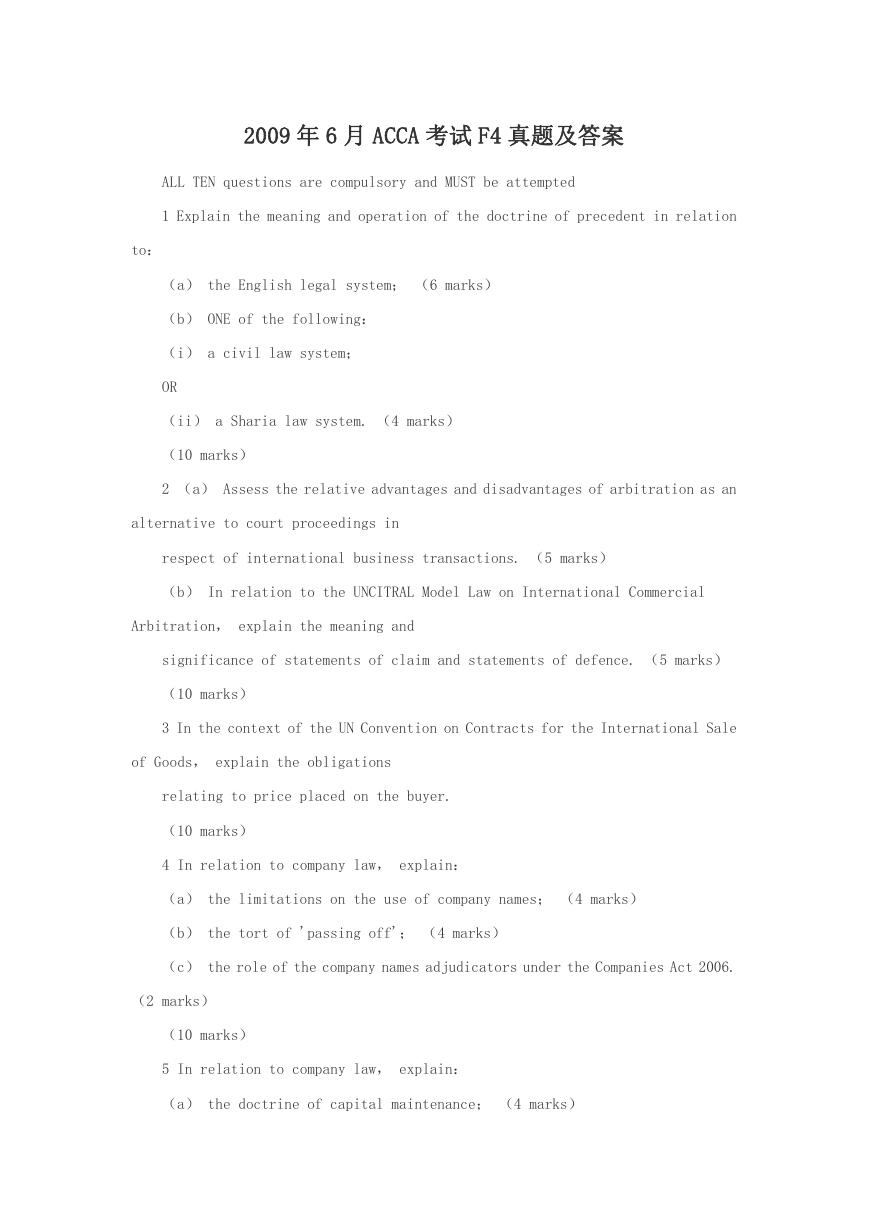
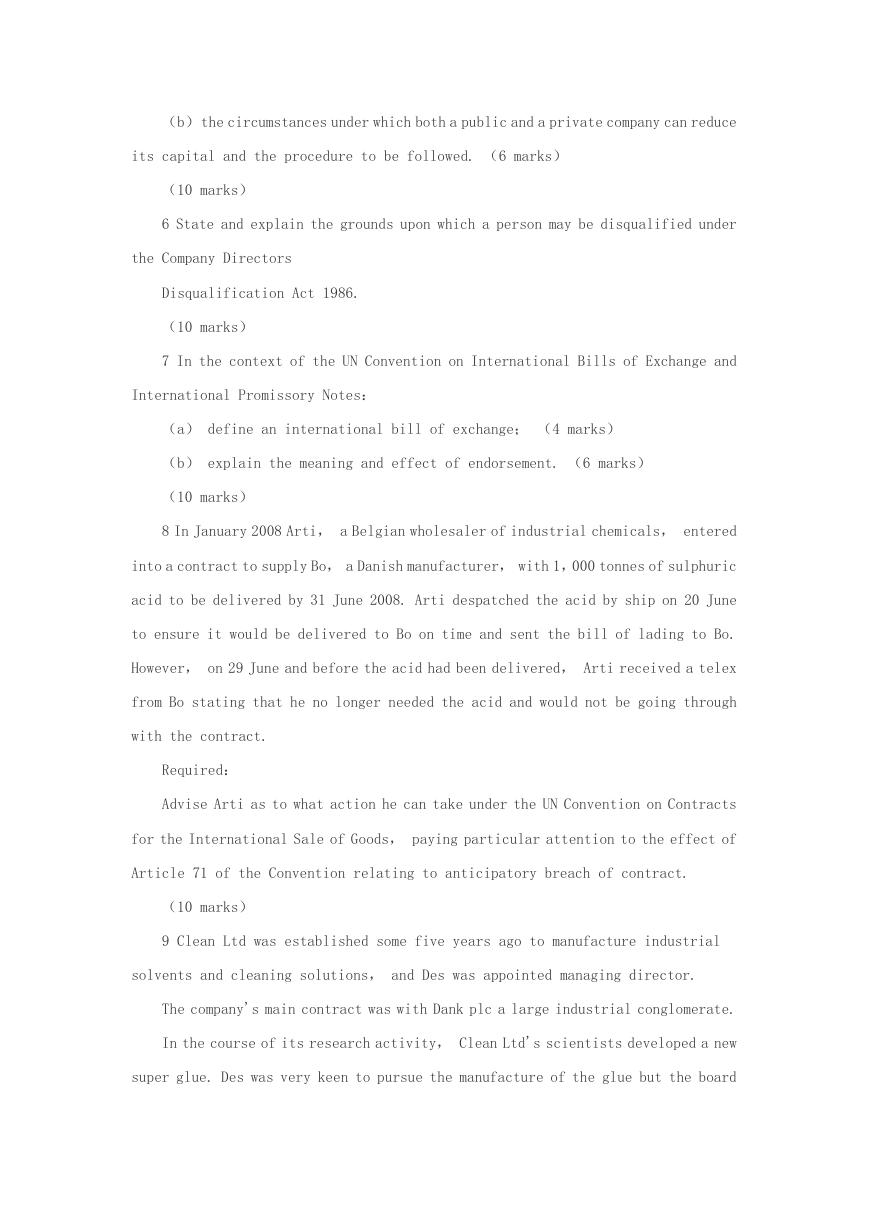
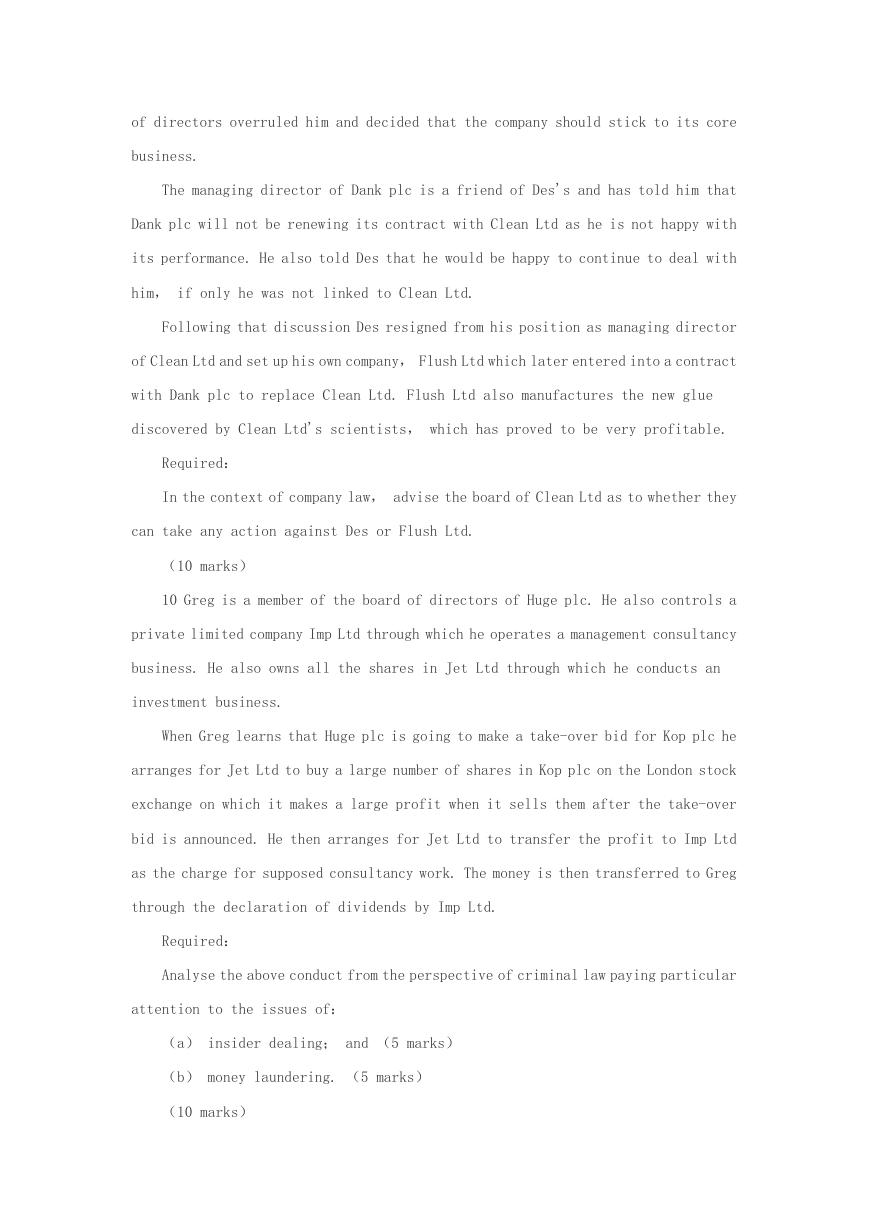
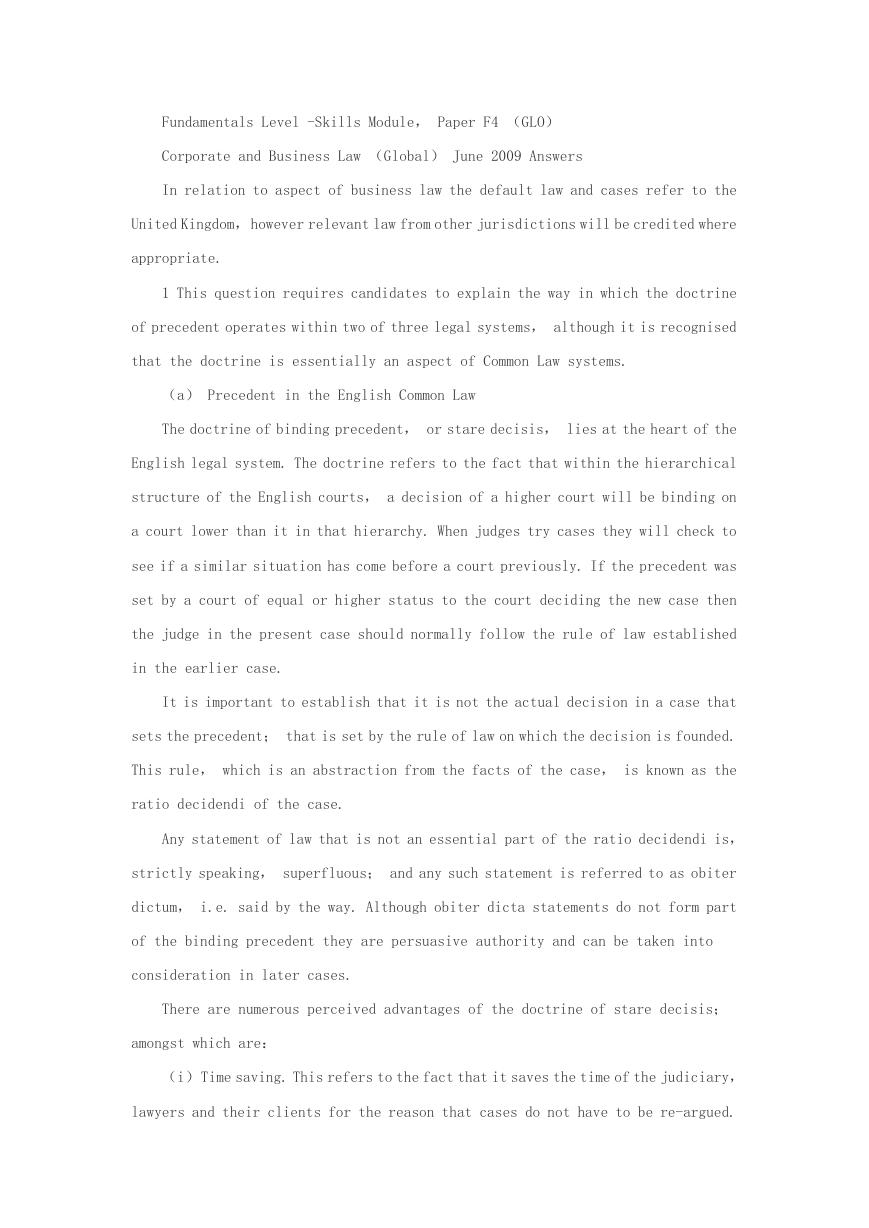


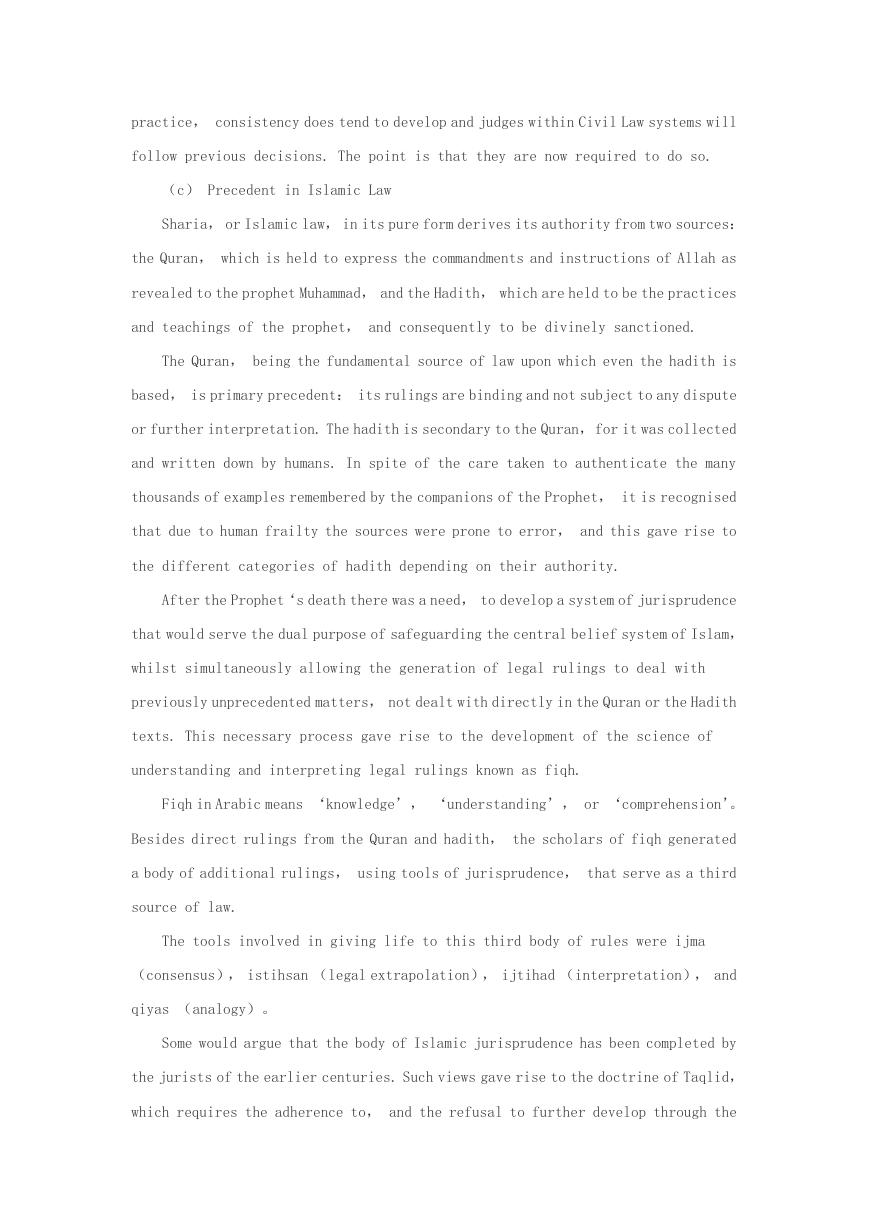
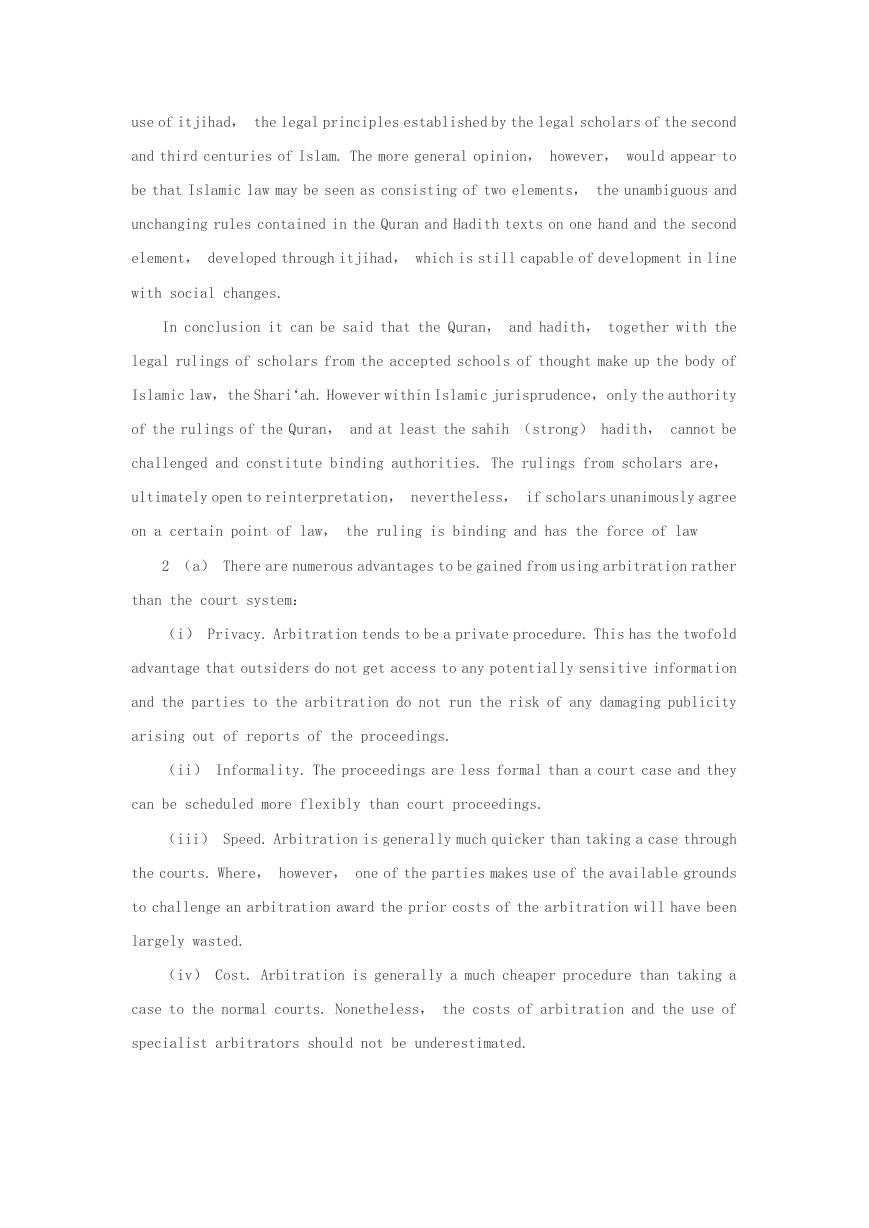








 2023年江西萍乡中考道德与法治真题及答案.doc
2023年江西萍乡中考道德与法治真题及答案.doc 2012年重庆南川中考生物真题及答案.doc
2012年重庆南川中考生物真题及答案.doc 2013年江西师范大学地理学综合及文艺理论基础考研真题.doc
2013年江西师范大学地理学综合及文艺理论基础考研真题.doc 2020年四川甘孜小升初语文真题及答案I卷.doc
2020年四川甘孜小升初语文真题及答案I卷.doc 2020年注册岩土工程师专业基础考试真题及答案.doc
2020年注册岩土工程师专业基础考试真题及答案.doc 2023-2024学年福建省厦门市九年级上学期数学月考试题及答案.doc
2023-2024学年福建省厦门市九年级上学期数学月考试题及答案.doc 2021-2022学年辽宁省沈阳市大东区九年级上学期语文期末试题及答案.doc
2021-2022学年辽宁省沈阳市大东区九年级上学期语文期末试题及答案.doc 2022-2023学年北京东城区初三第一学期物理期末试卷及答案.doc
2022-2023学年北京东城区初三第一学期物理期末试卷及答案.doc 2018上半年江西教师资格初中地理学科知识与教学能力真题及答案.doc
2018上半年江西教师资格初中地理学科知识与教学能力真题及答案.doc 2012年河北国家公务员申论考试真题及答案-省级.doc
2012年河北国家公务员申论考试真题及答案-省级.doc 2020-2021学年江苏省扬州市江都区邵樊片九年级上学期数学第一次质量检测试题及答案.doc
2020-2021学年江苏省扬州市江都区邵樊片九年级上学期数学第一次质量检测试题及答案.doc 2022下半年黑龙江教师资格证中学综合素质真题及答案.doc
2022下半年黑龙江教师资格证中学综合素质真题及答案.doc